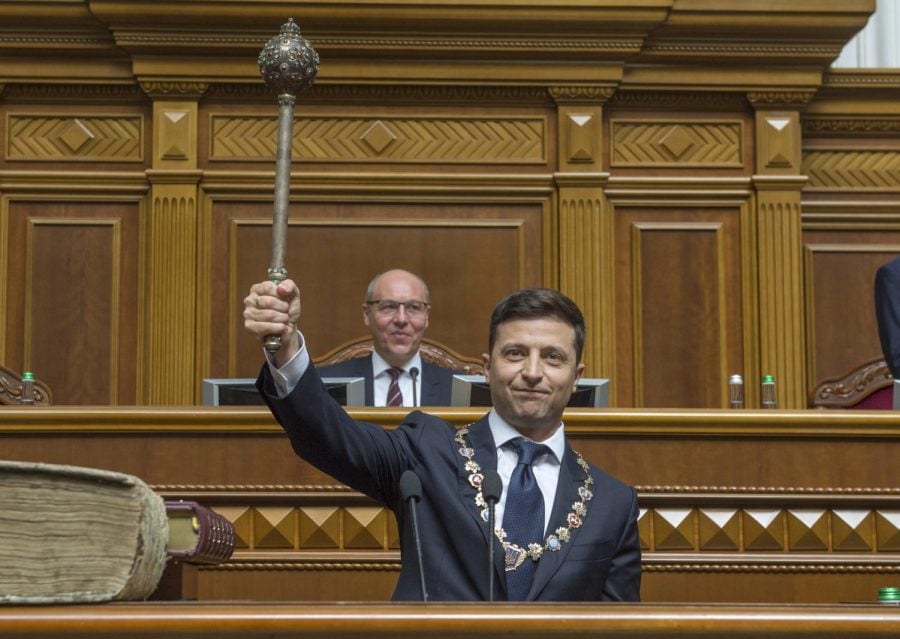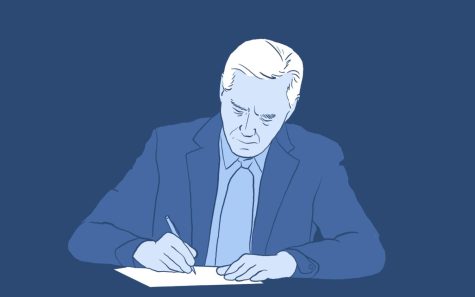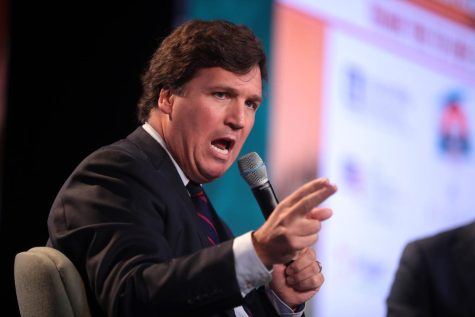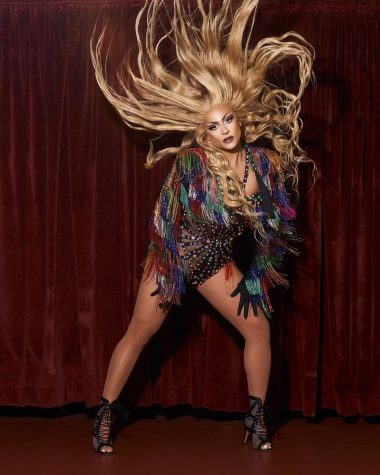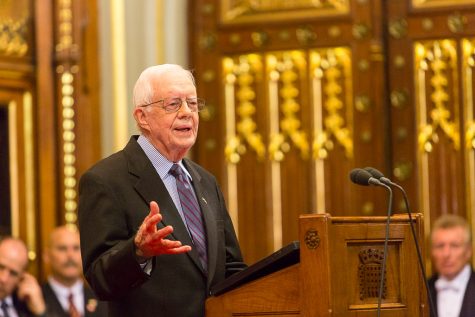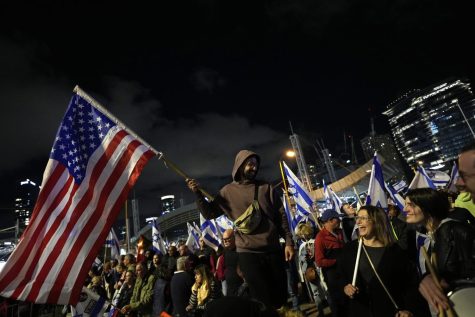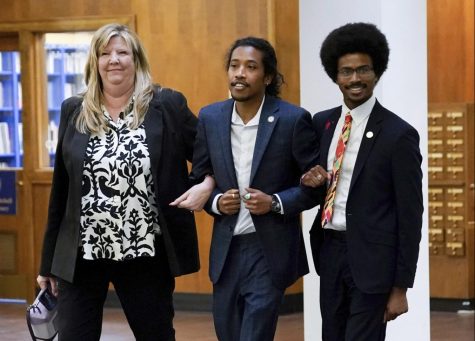Big challenges ahead for new Ukrainian president
Andrii Nesterenko | Ukrainian Parliament Press Service via AP
The new Ukrainian President Volodymyr Zelensky holds up a mace, the Ukrainian symbol of power, during his inauguration May 20, 2019.
As he was ushered in as the sixth president of Ukraine on May 20, comedian and TV actor-turned-politician Volodymyr Zelensky spoke of a “new era” of the country’s history — one that sees “people in power who will serve the people.”
His rise to power is an atypical one in a country operated by oligarchs and nepotism. His show, “Servant of the People,” seemed to presage his fate: in it, his character, a high school history teacher, becomes president after a video of him ranting against government corruption goes viral.
Zelensky, who cinched the most votes in the first round of elections, obtained 73.22 percent of the votes cast in the runoff election, defeating incumbent Petro Poroshenko’s 24.45 percent. Out of the nearly 45 million people living in Ukraine, 18.5 million took part in the two-part election cycle, with the highest turnout in the Dnipropetrovsk region in the southeastern part of the country.
Moving forward, Zelensky has a lot on his plate — one that doesn’t include a packed production schedule. With the backing and blessing of global leaders and organizations, including the European Commission and the U.S. State Department, he’ll have to juggle the military conflict in Donetsk, the annexation of Crimea, the hordes of Ukrainian separatist groups funded by Russia, rising inflation and devaluation of currency, and Ukraine’s candidacy to join the European Union — all while establishing his legitimacy as a leader.
But where to start?
“He needs to reform the role of the state and develop trust between the state and the society,” said Balázs Jarábik, a nonresident scholar with the Carnegie Endowment for International Peace program. “Ukraine doesn’t have a social contract: 80 percent of the population supported the dissolution of the Parliament.”
One of Zelensky’s first moves in office was to dissolve the current Ukrainian parliament and hold a snap election — one that will see every seat go up for grabs. Analysts say the move is designed to to establish a strong foothold for his administration and oust the oligarchs who have ruled the country since Ukraine’s independence from the USSR in 1991.
“He’s the best political satirist in the country, and he knows all the oligarchs because he made fun of them all the time. He used to be invited to these corporate events by these oligarchs to make them laugh… now he’s taking over,” Jarábik explained. “This is a new generation: They have very strong feelings and strong experiences about the state, and they understand that sooner or later they will have to go into conflict with the oligarchs.”
It’s a generation impacted by divisive political movements like the Orange Revolution in 2004 and the Revolution of Dignity, or Euromaidan, which rocked Kyiv in 2013 and 2014.
The latter was a response to then-leader Viktor Yanukovych’s failing to sign an agreement between Ukraine and the European Union that would have opened up free trade between the two parties; instead, Yanukovych accepted a $2 billion bailout from Russia and saw hundreds of thousands of protestors converge in the capital Kyiv’s Independence Square.
Michael MacKay, a former lecturer at the University of Kyiv-Mohyla, said the political change in the capital has influenced Ukrainian culture.
“Political culture shifted dramatically with the regaining of independence, with the Orange Revolution, and with the Revolution of Dignity,” he explained. “On each occasion the Ukrainian national character emerged: the spirit of direct democracy and also the spirit of unity of the people on the land, which transcends language or ethnicity.”
Appeals for unity and a strong push against corruption will likely define Zelensky’s next five years in office, especially in the wake of the scandal-plagued Poroshenko.
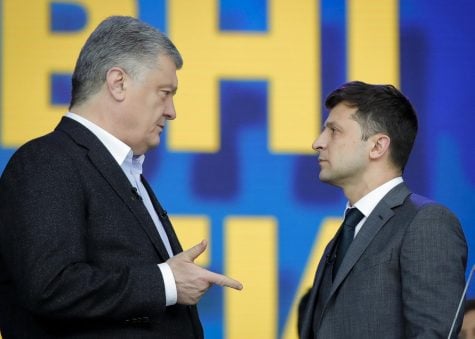
Then-Ukrainian presidential candidate Volodymyr Zelenskiy listens to then-President Petro Poroshenko during their final electoral campaign debate at the Olympic stadium in Kiev, Ukraine.
Poroshenko found himself caught in an embezzlement scandal with the Ukrainian military in early February of this year. Ihor Hladkovsky, the son of Oleh Hladkovsky, a former business partner and deputy head of the National Defense and Security Council, was found smuggling Russian military supplies into Ukraine so he could upcharge and sell them to Ukrainian factories — something that Bloomberg columnist Leonid Bershidsky termed the “most egregious crime.”
Also caught in the act was the National Anti-Corruption Bureau, who met with Poroshenko in a private meeting and removed the name of the younger Hladkovsky’s company from their list of suspicious businesses.
In the wake of the scandal, Zelensky posted a video to Facebook with a stern message: “People who came to power on blood are making money off blood.”
While Poroshenko may have had the experience, Zelensky’s lack of it appears to have benefited him — the latest in a string of recent populist victories around the world, spearheaded by an electorate tired of corruption and establishment elites, ready for clean slates and fresh faces.
Poroshenko — already unpopular from having to work to keep a fragmenting country pleased while combating Russian military actions — was such a figure. While he had been setting up offshore accounts that came to light during the Panama Papers leak, Zelensky actively supported the pro-EU, populist Euromaidan protests.
Michael Khodarkovsky, a historian at Loyola University Chicago, said this plays into a much larger narrative.
“What is interesting is that Zelensky is a part of the populist wave that is sweeping across Europe,” he said. “But in Western Europe, populists are the right-wingers who want to undermine the democratic institutions, while in Eastern Europe, it is the reverse: Populists like Zelensky are fighting for a genuine and free democracy.”
Zelensky highlighted these sentiments in his inaugural address last week, welcoming “all Ukrainians on the planet … to build a new, strong and successful Ukraine.”
“Skeptics will say that it is impossible, a fantasy,” he continued. “But what if this is, in fact, our national idea — to unite and make the impossible against all odds?”


